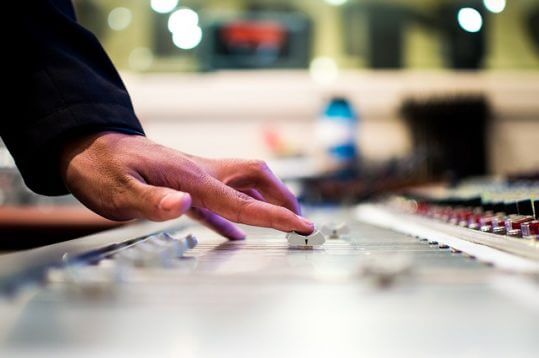Surprisingly with all the info out there, I still get this question or some form of this question where an artist doesn’t know what mixing or mastering is and it’s always painful for me to have to respond (but then I remember we were ALL once there).
So in this article, I’m going to break it down as simply and straightforward as possible.
What is mixing?

This isn’t the mixing we’re talking about.
Mixing is the process of taking individual audio tracks that make up a whole song and making those parts sound good together. That’s it! We’re done for today. Goodbye.
Of course, there’s much more to it but for the sake of simplicity, that’s basically what it is. The main thing to understand is the “individual parts” as the audio engineer will have access to each individual track and will therefore be able to manipulate it accordingly.
If you’re wondering what an individual track is? Then let me backtrack, an individual track is simply the vocal tracks, the drum tracks, the piano tracks, the bass tracks, the guitar tracks, etc; it is all the tracks that make up the song.
Mastering, on the other hand, (and you’ll get a more thorough read by checking out What is Mastering?) is basically taking a song that’s already mixed down, already one track, and making it sound louder, brighter and wider.
The purpose of mastering is to make it the same volume level as other songs (say on the same album) as well as to make it at the same volume level as other songs on radio, TV, and on streaming services.
Additionally, mastering may also fix minor issues that affect the overall song, say there’s white noise over the whole audio, mastering can remove it or lessen it.
Okay so now you know what mastering is, let’s talk about what mixing is!
What does mixing entail?

Now this is mixing!
Audio engineers will aside from adjusting the volume levels of the various tracks within the song, also add what are called effects (or “FX” for short) to your tracks to make them have the desired sound.
For example, compression and equalization will be added to your vocal track. Reverb will be added to your guitar. Stereo enhancers are added to your synths.
There are literally thousands of effects an engineer can add to your tracks as well as in various combinations to get different sounds.
For example, your vocal track could have effects such as distortion, autotune, compression, equalization, saturation, reverb, and delay.
How does an engineer know which effects to use?

The more grey in his beard, the more he knows.
To put it shortly, taste. It depends on the audio engineer’s taste and their experience listening and mixing a particular type of music.
Also the old saying, “one must know the rules, in order to break the rules” comes to mind as the rules of mixing change seemingly with every popular release.
The difference between the good artists and great artists is that they are able to effectively communicate with their engineer the sound they’re going for as well as have made sure their recording and production all lend themselves to that sound (as a mixer can’t really make a folk song sound like a heavy metal song).
Also, the difference between a good engineer and a great engineer is that they can already guess what sound an artist is going for or trying to go for and lead their sound in that particular direction (i.e. Hey your song could sound like this!).
Plus, most experienced audio engineers have not only spent a lifetime acquiring expensive and high-quality effects plugins but also know how and when to use them appropriately.
Should I mix my own music?
I recommend every artist attempt to mix their first few songs before they use any online mixing and mastering services, so they have an idea of what goes into the mixing process and so that they can communicate effectively with their mixer, instead of saying things like “Make it sound magical!”.
And who knows you might actually become a wizard at mixing your own stuff.
However, 90% of the time you’ll get better results if you get an engineer to mix it as they’ll not only provide “fresh trained ears” but they’ll hopefully have had a lot of practice mixing songs.
The keyword here is practice. Just like if you took piano lessons as a kid, you’ll know that you only got better when you kept practicing a ridiculous amount of time, the same goes for mixing.
I personally have probably mixed and mastered over 1000 songs in the last three years alone (I haven’t counted so don’t quote me on that). But you can probably imagine I like most audio engineers have heard it all by now.
Should I master my own music?
No. No. No. Definitely no. Unless you are a glutton for self-punishment and have a ton of time to waste plus don’t like your hair that much (cause you’ll be pulling your hair out) then master your own stuff.
Mastering is something you want to tackle once you nail mixing or at least understand the fundamentals of mixing well enough.
I see mixing as taking a “bottom-up approach” as you’re dealing with all the small parts of a song, whereas mastering is a “top-down approach” cause you’re dealing with the bigger picture.
If you have no idea what I’m talking about, you definitely shouldn’t be mastering your own stuff.
How can I tell good mixing from bad mixing?
This may take a little time to develop your ear but the easiest way is to compare.
For example, say you mix your song and then you send your song to an audio engineer to mix.
Wait a few days to listen to your version and the version the audio engineer sent you and play them back to back on the same system.
It should become apparent the flaws in your mix pretty quickly. Y
You’ll also probably not like some of the things the audio engineer did in their version of the mix.
A good thing to keep in mind is that mixing and mastering is all about making compromises as it is a bit of a balancing act.
There are trade-offs that are made when mixing a song and the more you mix the more you become aware of these trade offs.
For example, you can’t have loud and punchy 808s with really loud and full synths/vocals.
In fact, you’ll notice that the songs that have prominent kicks and bass, have the vocals pulled back a little.
In these types of songs, the lyrics don’t matter as much, rather the feeling the vocals convey matters more, or in other words, the vocals are just another instrument.
Obviously, in songs where the lyrics matter most, you wouldn’t hide them behind the instrumentation.
Now it’s your turn: Let me know in the comments if you understand the difference between mixing and mastering? If not what are you not getting about the difference?
Also be sure to checkout our Youtube channel where we turn articles like this into videos like this:
FAQ: Understanding Mixing and Mastering in Music Production
1. What is mixing in music production?
Mixing is the process of combining individual audio tracks (such as vocals, drums, guitars, etc.) to create a cohesive and balanced final mix. This involves adjusting volume levels, adding effects, and ensuring that all elements of the song blend together harmoniously.
2. What is mastering in music production?
Mastering is the final step in the music production process, where the final mix of a song is processed to enhance its overall sound quality. This includes adjusting the overall volume, clarity, and dynamic range of the song to ensure it sounds polished and professional.
3. How does an audio engineer know which effects to use in mixing?
The choice of effects in mixing is often based on the audio engineer’s taste and experience. They use their knowledge of music production techniques and their understanding of the artist’s vision to select effects that enhance the sound of the individual tracks and the overall mix.
4. Should I mix my own music?
It can be beneficial for artists to attempt mixing their own music to gain a better understanding of the process. However, for best results, it is recommended to have an experienced audio engineer mix your music, as they can provide fresh ears and professional expertise.
5. Should I master my own music?
No, mastering is a specialized skill that requires experience and a trained ear. It is best left to professional mastering engineers who can enhance the overall sound of your music and ensure it meets industry standards for volume and clarity.
6. How can I tell good mixing from bad mixing?
One way to differentiate between good and bad mixing is to compare different versions of your song. Listen to your own mix and a professionally mixed version back-to-back on the same system. Pay attention to the balance of instruments, clarity of vocals, and overall sound quality to identify any flaws in your mix.
7. What are some common mistakes to avoid in mixing and mastering?
Some common mistakes to avoid in mixing and mastering include over-processing tracks, using too many effects, neglecting to reference other songs for comparison, and not taking breaks to rest your ears. It’s important to approach mixing and mastering with a balanced and careful mindset to achieve the best results.



This is really awesome that you share such needed information! I don’t mix or master, but as an artist, i feel we should know these things. Thank you for sharing!